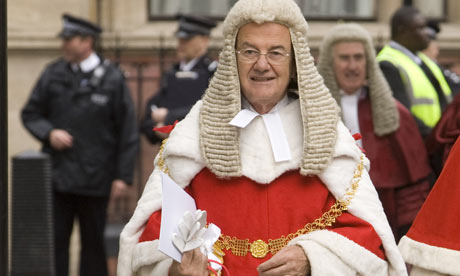
HMG does not want the public to read letters written to it by the Prince of Wales because in so writing he is practising to be HMK and should be allowed to do so in private. The Information Commissioner, the First Tier Tribunal and the Upper Tribunal disagreed and ordered disclosure of the letters. HMG did not appeal to the Court of Appeal or even onwards to the Supreme Court and therefore must have concluded that there is no error of law in the Upper Tribunal's decision (we speculate). Instead the AG on behalf of HMG has simply vetoed publication. FOIA permits this (section 53). HMG does not have the last word because the decision to veto can be judicially reviewed, although ultimately HMG could resist an order setting aside the veto because the High Court cannot commit a Govt Minister to prison (M v Home Office [1993] 3 WLR 433) and lacks any coercive power against the Crown (from whom all coercive power is derived - if the Crown is one singular corporation with many faces then the Warrant of Committal would involve the Crown calling on its Officers and Constables to drag itself to prison). & why shouldn't HMG have the final word?

The Crown in Parliament is Sovereign and it has handed the final word, to override the judgment of a Tribunal or Court, to the Crown (or more prosaically HMG). I can't really understand why the LCJ, in his
judgment supporting the majority view that the JR against the veto in the Prince of Wales case should be dismissed, gets so anxious about the whole constitutional propriety of section 53 and the veto. Here are some of the odder passages of the judgment:
Para 2 - The possibility that a minister of the Crown may lawfully override the decision of a superior court of record involves what appears to be a constitutional aberration.
Why is it an aberration if it is authorised by Parliament?
Para 8 - Section 53 has been described as an executive override: so it is. Notwithstanding the
unchallenged judgment of the Upper Tribunal, following an examination of the claim
for exemption based on the public interest, a member of the executive is empowered to set aside or nullify the decision. Accordingly, therefore, the disclosure obligation of the relevant public authority based on the decision of the court has been dispensed with by a member of the executive, or the Attorney General acting on behalf of a minister in the previous administration. The identical power is available for use even when the decision to be overridden was made by the Supreme Court of the United Kingdom
What has the Supreme Court got to do with it? It has the same duty as any other Court to comply with legislation as enacted by Parliament - why should its decision carry any more weight in this context than that of a lowly Tribunal Judge - HMG has to obey all Court/Tribunal judgments unless Parliament says otherwise - the Supreme Court has no special status - remember it does not have any special constitutional status such as 'Supreme Courts' have elsewhere, most notably in the USA.
Para 10 - We all understand that in our constitutional arrangements Parliament is sovereign.
Decisions, even of the Supreme Court, may be set aside through the ordinary legislative processes. Thus, in the context of witness anonymity in the criminal courts, the Criminal Evidence (Witness Anonymity) Act 2008 in effect set aside the decision of the House of Lords to the contrary effect in R v Davis [2008] 1 AC 1128. That, however, is not what s.53 provides. It simply vests power in a cabinet minister to override the decision of a court without further recourse to the legislature. It is not quite a pernicious “Henry VIII clause”, which enables a minister to override statute but, unconstrained, it would have the same damaging effect on the rule of law.
Parliament has authorised HMG to override a Court or Tribunal order without having to go back to Parliament to seek further authority - that is what the democratic legislature has done - why is the Court concerned with the propriety of this? Then he seriously goes off piste:
Para 11: The provisions of s.53 must therefore be examined with these troublesome concerns in mind. Parliament created a right in members of the public to be granted a great deal of but not all the information held by public authorities. It provided, further, that the decisions of the public authorities adverse to disclosure should be subjected to a number of different methods of independent, and ultimately judicial, examination. Thereafter, on the basis that the final responsibility for deciding the public interest should remain with ministers, they were vested with the power to override the judicial
decision. If that were the full extent of this legislative structure, then, while recognising that the relevant minister may have a particular insight into and a major contribution to make to the protection of the public interest, I should entertain the very gravest reservations whether this provision could fall within the constitutionality principle. Unconstrained by the internal legislative structure, rather than by reference to the much vaguer good sense of or wise discretion of any individual minister, we should be addressing a remarkable provision which empowered the minister to set aside the decision of a court after litigation in which the department for which he is responsible was the unsuccessful party.
12. It is fundamental to the constitutional separation of powers, the independence of the judiciary, and the rule of law itself that, although judicial decisions may be reversed by legislation (but very rarely with retrospective effect) ministers are bound by and cannot override judicial decisions: in our constitution that power is vested in Parliament. If ever the Government or any minister in the Cabinet could, without more, but in particular because of dissatisfaction with a judicial decision, not merely
ignore it, but nullify it, the elementary entitlement of the citizen to effective recourse to independent courts would be extinguished.
What? In enacting section 53 FOIA Parliament has authorised the nullification of a judicial decision - the Judges just have to live with it - there is absolutely nothing they can do about it - their strict duty is to apply the law as made by Parliament - even if contrary to the ECHR - which includes any provision which conflicts with EU law - which they can strike down, but only because an Act of Parliament allows them to do so. Otherwise - Judges must do as Parliament tells them.....whether they like it or not..................The LCJ appears to be hinting that if the Judges did not like the look of the veto power, they might declare it unconstitutional at common law and ignore it - NOW THAT WOULD BE A CONSTITUTIONAL ABERRATION.........
 I was dearly hoping that Stuart-Smith J fils was going to be as robust as his father. He has been dealing with CPS incompetence - this is just a summary while we await the full blunderbuss of the judgment: I love the idea that one of their excuses was that they were incompetent............Good luck to Alison Saunders CB, CCP for London, who takes over as DPP in November...........
I was dearly hoping that Stuart-Smith J fils was going to be as robust as his father. He has been dealing with CPS incompetence - this is just a summary while we await the full blunderbuss of the judgment: I love the idea that one of their excuses was that they were incompetent............Good luck to Alison Saunders CB, CCP for London, who takes over as DPP in November...........


